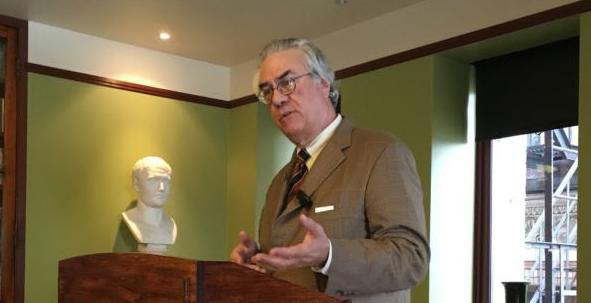Staying Informed – Discerning Real from Fake News

Fake news! Alternative facts! In a single week recently, three major news outlets had to retract or substantially modify reporting they put out to their audience. We have seen a big-name journalist suspended from his network because of inaccurate reporting. Unfortunately, the old adage that “politics stops at the water’s edge” no longer guides our elected officials or our news commentators. When elected officials from either side of the aisle appear on the news shows they seem unwilling, or indeed unable, to depart from lame party talking points. In our hyper-partisan moment, it can seem difficult to find the information we need to be well and accurately informed about global events. Here are the ways I try to cut through the clutter and find good information.
First, despite all the noise and dust, there really are some solid sources out there. Three of my favorite sources for international news in the print media are the Financial Times as a daily newspaper, the Economist as a newsweekly, and Foreign Affairs as a bi-monthly source of essays and longer analytic pieces. The web site accompanying Foreign Affairs gives more background on topics much in the news in greater depth. You can receive a discount on the Economist and Foreign Affairs with your membership in the World Affairs Council.
Several think tanks provide very rich coverage of international events with position papers, full analysis, Congressional testimony and op-ed pieces. While each of these tends to have a particular view and may lean a little to the right or to the left, I find them generally balanced and thought-provoking. My favorites are the Center for Strategic and International Studies, the Rand Corporation, the Strategic Studies Institute, and for international economics and finance, the Peterson Institute for International Economics. Among the sites from the Federal government, I like the US Institute of Peace and the National War College. Among our recent speakers, we had two professors from the National War College, who provided excellent perspective.
The speakers that the World Affairs Council brings to us are typically experts who have spent their entire careers studying a topic or a region. One of the values that I personally find in hearing their presentations comes from learning the mental models, frameworks and paradigms they use to analyze their area of expertise. I then use the models they describe to help me hang news on as it unfolds. That way the news doesn’t just seem like a random string of factoids thrown at me, but pieces of the puzzle that enrich my understanding of the big picture. I encourage all our members to make every effort to hear our guest speakers – the value will stay with you much longer than the hour or two you invest to hear them.
But despite all these sources, I am increasingly drawn to taking a look at more primary sources. It is surprisingly easy and informative. I will give some quick examples. How much ink and airtime was spent arguing, often in very partisan terms on both sides about the Iran nuclear deal? Commentators were everywhere all giving full-throated opinions on its wisdom or folly. It is easy to find the complete text on line: it runs to about 25 pages double spaced. We regularly read this much in our professional lives. The text is understandable – you need not be a career nuclear negotiator to comprehend it. My encouragement? Read it for yourself. You will be better informed than if you had read eight editorials on the subject, which would be of comparable length.
Another good example comes from the plea bargain struck by General Flynn. Regardless of your personal political preference, it was understandably alarming when shortly after his very brief tenure as national security advisor, he struck a plea bargain. This brought a tidal wave of hyper-partisan bickering. The plea bargain can be found online, too. Read it and form your judgment.
Finally, Xi Jinping’s three hour speech to the Party Congress in China has been called the most important political speech since Gorbachev’s 1991 speech dissolving the Soviet Union. Yes, this can also be found on-line in English translation, although I admit it is longer than my other examples. Time spent reading this may help your understanding of events in the world for the next decade.
Perhaps because I have run out of time, or run out of patience with the spin, the commentators, and the overheated rhetoric, I am personally relying more and more on reading the source documents. They are easy to find, can be understood by the informed layman, and allow you to trust your own judgment.
I hope you see how the World Affairs Council can be an important part of your global understanding – it certainly helps me!
Rich Lauf
Board Chair


